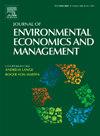Do microclimates matter? The health impacts of urban heat using fine-scale data
IF 5.9
3区 经济学
Q1 BUSINESS
Journal of Environmental Economics and Management
Pub Date : 2025-05-23
DOI:10.1016/j.jeem.2025.103191
引用次数: 0
Abstract
Cities tend to be warmer than their suburban counterparts, a phenomenon known as the heat island effect. This effect varies significantly over time and across different neighborhoods. This study examines the health implications of neighborhood-level temperature variations and the role of urban heat in the temperature–health relationship. Using high-resolution satellite-derived surface temperature data and emergency medical service records from Northern California, the analysis employs fixed-effects Poisson regressions. The findings show that neighborhood-level extreme heat has significant adverse health effects. However, urban heat—a highly localized and predominantly anthropogenic component of overall temperature—is less harmful than temperature shifts on a larger geographic scale. This is likely because people can better adapt to urban heat. These results highlight the importance of considering both overall temperature exposure and adaptation potential in urban environments. The effects of urban heat also vary by season. While additional warmth can provide protection during colder periods, it poses substantial health risks on warmer days. Finally, policy simulations suggest that mitigating extreme urban heat could effectively reduce health risks, particularly during warm periods. Tree planting, especially in less vegetated areas, is a beneficial strategy for protecting urban populations.
小气候有影响吗?利用精细尺度数据研究城市热量对健康的影响
城市往往比郊区更温暖,这种现象被称为热岛效应。这种影响随着时间的推移和不同社区的差异很大。本研究探讨了邻里水平温度变化对健康的影响,以及城市热量在温度-健康关系中的作用。利用来自北加州的高分辨率卫星获取的地表温度数据和紧急医疗服务记录,分析采用了固定效应泊松回归。研究结果表明,社区极端高温对健康有显著的不利影响。然而,城市热量——总体温度的高度局域化和主要人为因素——比更大地理范围内的温度变化危害更小。这可能是因为人们能更好地适应城市的高温。这些结果强调了考虑城市环境中整体温度暴露和适应潜力的重要性。城市热量的影响也因季节而异。虽然额外的温暖可以在寒冷的季节提供保护,但在温暖的日子里,它会带来巨大的健康风险。最后,政策模拟表明,减轻城市极端高温可以有效降低健康风险,特别是在温暖时期。植树造林,特别是在植被较少的地区,是保护城市人口的有益策略。
本文章由计算机程序翻译,如有差异,请以英文原文为准。
求助全文
约1分钟内获得全文
求助全文
来源期刊
CiteScore
8.00
自引率
4.30%
发文量
91
期刊介绍:
The Journal of Environmental Economics and Management publishes theoretical and empirical papers devoted to specific natural resources and environmental issues. For consideration, papers should (1) contain a substantial element embodying the linkage between economic systems and environmental and natural resources systems or (2) be of substantial importance in understanding the management and/or social control of the economy in its relations with the natural environment. Although the general orientation of the journal is toward economics, interdisciplinary papers by researchers in other fields of interest to resource and environmental economists will be welcomed.

 求助内容:
求助内容: 应助结果提醒方式:
应助结果提醒方式:


